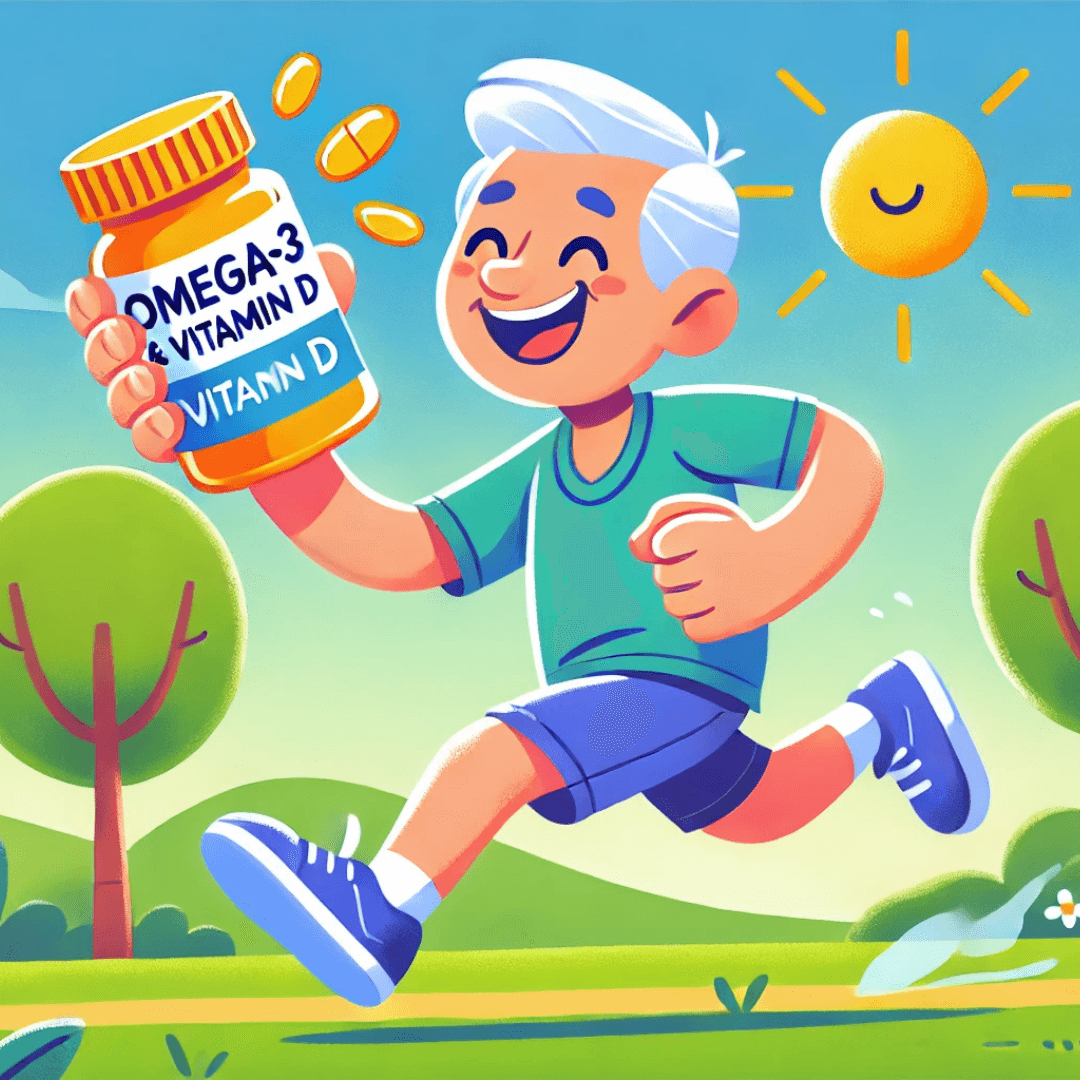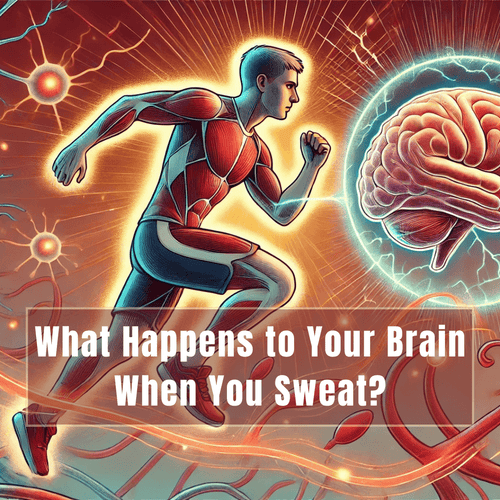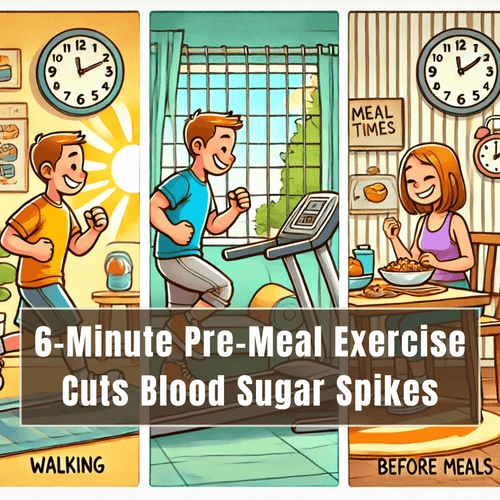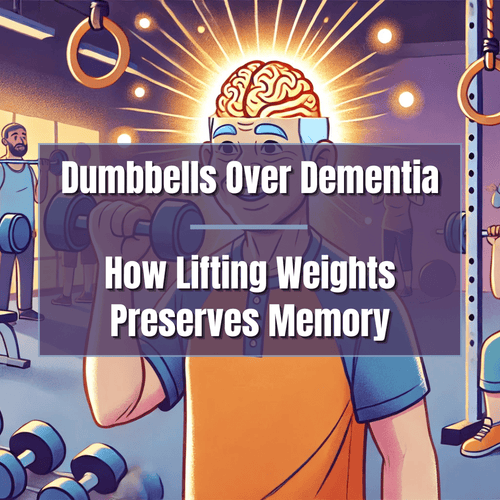
Aging is inevitable, but what if you could slow it down at a cellular level? New research (Bischoff-Ferrari HA, et.al., 2025) suggests that vitamin D, omega-3 fatty acids, and exercise may help delay biological aging by influencing DNA methylation clocks—the markers that scientists use to measure aging.
A three-year study involving 777 participants found that omega-3 supplementation alone had a significant impact on slowing biological aging. Even better, when combined with vitamin D and exercise, the benefits were additive, providing even more protection against aging.
Let’s dive into what this means for you and how you can apply these findings to your daily life.
Understanding Biological Aging and DNA Methylation
Aging isn’t just about wrinkles or grey hair; it happens at a molecular level. Scientists measure biological aging using DNA methylation clocks—a way to track changes in your genetic material over time.
In this study, researchers focused on four different DNA methylation measures:
- PhenoAge
- GrimAge
- GrimAge2
- DunedinPACE
These "clocks" predict lifespan, disease risk, and overall health. The slower these markers change, the better for longevity.
The key takeaway? Omega-3, vitamin D, and exercise can slow down these aging markers.
What the Research Found: Slowing Aging with Omega-3, Vitamin D, and Exercise
The DO-HEALTH trial, a large European study, tested whether taking vitamin D (2,000 IU daily), omega-3 (1g daily), and a simple home exercise program could slow biological aging.
Key Findings:
✔ Omega-3 alone slowed aging: It reduced the speed of the PhenoAge, GrimAge2, and DunedinPACE DNA methylation clocks.
✔ Combined treatments had even greater effects: When participants took omega-3, vitamin D, and exercised together, the aging slowdown effect was stronger.
✔ The benefits increased over time: The protective effect built up over the three-year period, delaying biological aging by an estimated 2.9 to 3.8 months.
This might not seem like a huge number, but over a lifetime, these small changes add up—potentially extending your health span, the number of years you live in good health.
Why Omega-3s Are Key to Slowing Aging
Omega-3 fatty acids are essential for brain health, heart function, and reducing inflammation. But this study adds another reason to take them—they directly impact DNA methylation and slow down aging at a genetic level.
How does omega-3 help?
- Lowers chronic inflammation, which speeds up aging.
- Supports brain health and may reduce cognitive decline. (Learn more about brain health supplements here)
- Helps balance omega-6 and omega-3 ratios, which is crucial for longevity. (More on this topic here)
If you want to boost your omega-3 intake, consider a high-quality fish oil supplement like Better Fish Oil, which contains an optimal EPA/DHA ratio for maximum benefit.
Vitamin D: The Underrated Longevity Nutrient
Most people know that vitamin D is crucial for bone health, but it also plays a key role in slowing biological aging.
How does vitamin D help?
✔ Supports immune function and reduces chronic inflammation.
✔ Helps regulate genes related to aging.
✔ Lowers the risk of age-related diseases like heart disease and cancer.
In this study, vitamin D had a greater effect when combined with omega-3 and exercise—meaning that taking all three together is the best strategy.
To ensure you're getting enough vitamin D, check out Vitamin D3, which provides 1000 IU of highly bioavailable cholecalciferol.
Exercise: The Ultimate Anti-Aging Habit
You already know exercise is good for you, but this study proves it literally slows aging at a cellular level.
Even a simple home-based exercise routine—as used in the study—had a measurable effect on DNA methylation.
✔ Increases cellular repair and regeneration.
✔ Enhances the benefits of omega-3 and vitamin D.
✔ Slows down biological aging markers.
The best part? You don’t need to spend hours in the gym. Regular movement, such as walking, resistance training, and stretching, can provide lasting benefits.
How to Apply This Science to Your Life
Want to slow down aging and improve your longevity? Here’s your action plan:
1️⃣ Take omega-3 daily – Aim for 1g per day with a high EPA/DHA ratio. Try Better Fish Oil for a pharmaceutical-grade formula.
2️⃣ Get enough vitamin D – A dose of 2,000 IU per day is optimal. Supplement with Vitamin D3 to ensure you’re covered.
3️⃣ Exercise regularly – Even 15-30 minutes a day of movement (walking, resistance bands, or yoga) can help slow down aging.
4️⃣ Balance your omega-3 to omega-6 ratio – Most Western diets are too high in omega-6, which promotes inflammation. Read more on balancing your fats here.
Final Thoughts: A Science-Backed Approach to Longevity
This isn’t just another health trend—the science is clear. Omega-3s, vitamin D, and exercise directly influence how your body ages at a molecular level.
By making small, sustainable changes in your diet and lifestyle, you can slow down biological aging and improve your overall health span.
Ready to take control of your aging process? Start with high-quality supplements and daily movement, and your future self will thank you.
👉 Get your daily omega-3 and vitamin D today:
- 🐟 Better Fish Oil for high-potency omega-3.
- 🌞 Vitamin D3 for optimal immune and bone support.
Reference
Bischoff-Ferrari HA, Gängler S, Wieczorek M, Belsky DW, Ryan J, Kressig RW, Stähelin HB, Theiler R, Dawson-Hughes B, Rizzoli R, Vellas B, Rouch L, Guyonnet S, Egli A, Orav EJ, Willett W, Horvath S. Individual and additive effects of vitamin D, omega-3 and exercise on DNA methylation clocks of biological aging in older adults from the DO-HEALTH trial. Nat Aging. 2025 Feb 3.









